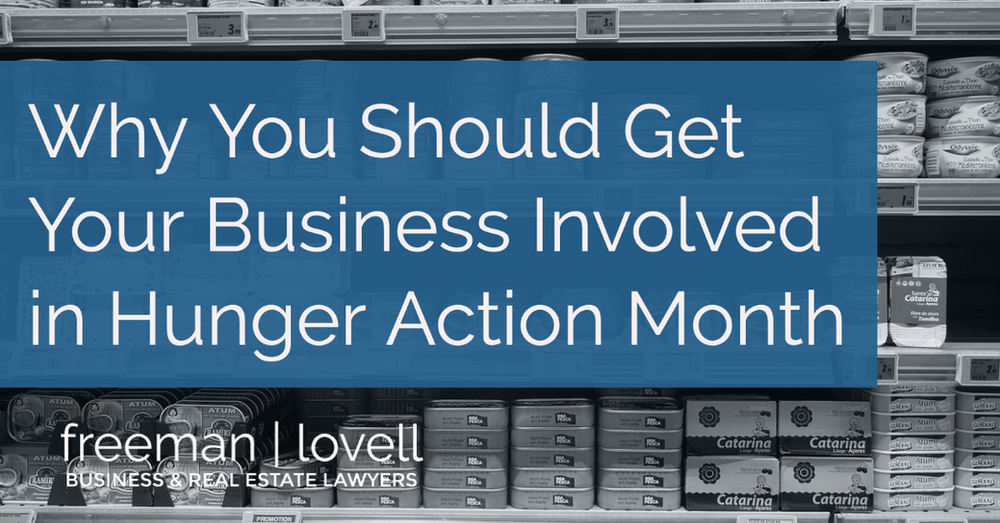
Together, We Can Make a Difference
September is Hunger Action Month, and we at Freeman Lovell are encouraging all entrepreneurs to do their part to make a difference.
Why Should You Join?
Every year, families and individuals alike struggle to make ends meet. Unfortunately, the amount affected has increased significantly over the past year and a half, with over 38 million Americans suffering from hunger. A combination of all-time high unemployment rates, decreased access to many social services, and closed school cafeterias have caused many people to question when their child’s next meal will be.
When you commit to making a difference during Hunger Action Month, you provide life-changing resources to those in need.
Who Are You Helping?
No community is immune from the effects of food insecurity, and it’s the responsibility of all to do our part to ensure that no person goes hungry. So, when you give back, who are you helping?
- Minority Communities - Systemic racial inequality has caused minority communities, especially LatinX, Black, Indigenous, and refugee-heavy areas, to have decreased access to amenities, transportation, and jobs with livable wages.
- Rural Communities - Rural communities often have fewer resources and suffer from supply chain dilemmas. In addition, government aid often is inaccessible to those who live rurally and cannot access their local government buildings.
- The Elderly - Not all elderly individuals have the financial means to support themselves after retirement. And if their families are unable to help or don’t have family or friends nearby, many go without food.
- Veterans - Researchers estimate that at least 11% of homeless populations in the US are veterans. And even the veterans who are not homeless often do not have the financial means to support themselves consistently, especially if they were injured in the line of duty.
- Low-Income Families - 38% of children live in low-income households. Depending on the size of the family and their unique situations, many of these low-income houses cannot afford to feed themselves consistently.
- Single-Parent Households - 15.3 million children live with a single mother, and 3.7 million live with a single father. Single mothers are often given fewer opportunities to rise in their careers or can only work part-time to care for their children.
- You Help Everyone - Ultimately, when you give back during Hunger Action Month, you are helping friends, family, community members, neighbors, and strangers alike. Everyone deserves to feel secure about when they will eat their next meal.
How Do You Get Involved?
There are so many ways to get involved with Hunger Action Month. You can donate your time, money, or resources to help those in your community.
Here are a few easy ideas:
- Host an office or community food drive for a local food bank.
- Bring your office out to volunteer at a shelter.
- Speak up and use your influence to make changes to your local government that can benefit the hungry.
- Make a monetary donation to your local food bank or shelter.
- Speak with your local food bank or shelter to find out what other materials and resources you can donate to best serve your community.
- Sponsor school lunches for low-income children in your area.
Local Resources:
We have added links to local food banks and hunger statistics for each of our office locations for your convenience.
Massachusetts: , Massachusetts Food Bank , Massachusetts Hunger Stats
Maryland: , Maryland Food Bank , Maryland Hunger Stats
Want to take a more hands-on approach? Many religious and educational groups provide services and meals for the needy. If you’re interested in getting involved at a grassroots level, this could be a great option for you and your team.
Ultimately, it doesn’t matter as much HOW you give back, so long as you DO give back in one way or another. As Winston Churchill once said, “We make a living by what we get, but we make a life by what we give.”
Still On the Fence?
We all know that participating in philanthropic endeavors is the right thing to do. Still, if you need a little more encouragement about how philanthropy can positively affect your ROI, we’ve got your back.
In today’s world, , you can’t underestimate the power of brand reputation . Having a brand geared for good creates a strong company culture. It also makes a message your audience can relate to (provided that you are authentic and genuine when participating in these endeavors).
Being a brand that gives back shows that you are actively making your community a better place for all. Become a leader for positive change, and you will be surprised by how your business can blossom.
Want to learn more about how to get your business involved with community outreach programs, nonprofits, scholarships, etc.? Our team of experienced business attorneys at Freeman | Lovell, PLLC, can help. Schedule a , consultation today to get started.




